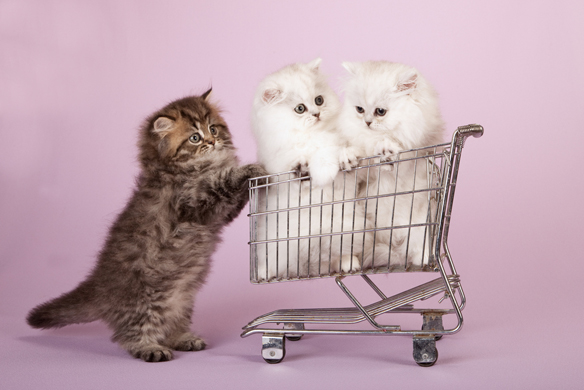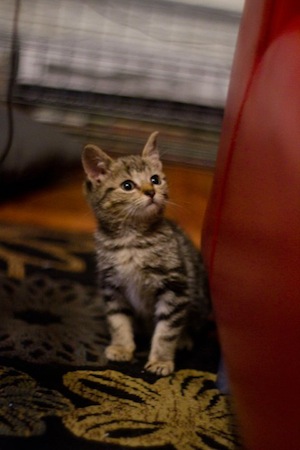
Why The Internet Chose Cats
Popular themes for internet cat pictures suggest that the cat is perplexed by his/her environment; the cat is demanding of something in a regal fashion [cats may often be implied to be ‘overlords’ or ruling-class characters from science-fiction movies]; the cat is excited to have succeeded at something while remaining oblivious to the practicality of…
It is widely-known that some people are ‘dog people’ and others are ‘cat people’. In fact, in mainstream romantic comedies, whether or not someone is a ‘dog person’ is often central to the evolving relationship. Countless films exist in which someone’s status as a ‘dog person’ or ‘not a dog person’ acts as the primary or major secondary plot conflict.
In early 2010, specific research was conducted by a University of Texas at Austin that found almost 42 percent of Americans self-identify as ‘dog people’ versus only 12 percent who reported they are ‘cat people’. About 28 percent said ‘both’ and 15 percent said ‘neither’. Which means that according to this dude’s research, more people dislike both types of furry housepets than express a distinct cat preference.
Yet the internet widely prefers cats. Some of the most popular Internet memes are related to cats. The /b/, or ‘random’ section of popular image board 4chan, which is reputed to be a ‘den of festering evil’ by people who wince anxiously and mispronounce ‘4chan’ while chatting in office cubicles, once routinely created an entire ‘holiday’ devoted to posting cat pictures. As most common internet culture memes are derivatives, loosely, of things people did on 4chan three years prior, it is unsurprising that the ‘Caturday’ holiday became, like, ‘a thing’ for people who would self-identify as moderate to heavy internet users.
It similarly became popular to caption images with white block text in order to make them funnier; thanks to the unfortunately-named website ‘memegenerator.net’, images with white text on them from the internet became known as ‘memes’ even though ‘meme’ doesn’t mean ‘picture with white text on it’. Cat memes are generally the most popular type of captioned image; people go to websites such as ‘cute overload’, ‘icanhazcheezburger’, and, more recently, ‘cute boys with cats’ and, perhaps the most exciting of a million cat-related Tumblrs, ‘cashcats.biz,’ simply to view pictures of cute cats all day, with or without text thereupon.
Popular themes for internet cat pictures suggest that the cat is perplexed by his/her environment; the cat is demanding of something in a regal fashion [cats may often be implied to be ‘overlords’ or ruling-class characters from science-fiction movies]; the cat is excited to have succeeded at something while remaining oblivious to the practicality of his/her accomplishment; the cat has instructed someone, presumably the viewer, to explain a set of circumstances to it.
Images of dogs are much, much rarer, and are certainly not as widely celebrated. The few well-known dog memes portray the dog as a ridiculous character, often the victim of the cat; popular themes for widely-circulated dog photographs include mocking the dog for not enjoying a plate of vegetables, mocking the dog for making an unusual expression implied to be fear, confusion or strong distaste, or otherwise general amusement at the expense of the dog’s ‘dignity’.

Given the overwhelming preference for dogs apparent in mainstream entertainment media and in statistical analysis among Americans, the cat’s election as unofficial ‘mascot of the Internet’ is a phenomenon worth noting. Certainly, some of this can be explained by facts such as ‘internet culture pioneers are not representative of the norm’; ‘the internet is a haven for subcultures to express preferences less welcome in mainstream society’; and ‘people who are dog people are probably doing things like throwing a Frisbee outside, painting a fence in suburbia, driving to a relevant chain restaurant or giving birth to children in a hospital setting , not going online creating Tumblrs.’
But the University of Texas at Austin’s research focused expressly on specific personality traits that may be common to one type of pet loyalist versus the other. It aimed to examine, in its own words, the “widely held cultural belief that the pet species—dog or cat—with which a person has the strongest affinity says something about the individual’s personality,” according to the head researcher on the project.
The research found that “Dog people were generally about 15 percent more extraverted, 13 percent more agreeable and 11 percent more conscientious than cat people” and “Cat people were generally about 12 percent more neurotic and 11 percent more open than dog people”.
Imagine one were somehow able to contact an individual, possibly an alien from another planet and/or someone who had never before used the internet, who were capable of being objective about internet culture, and if one sat that individual down in front of a computer and encouraged them to explore internet communities for the first time [assumedly one would assist the individual with navigating the internet with the ease of someone who was familiar with it].
Imagine that alien/individual viewing the cultures whereby people take the time to visit a user’s Formspring page simply to ask an extremely dickish anonymous question; whereby people go to great lengths to create communities that are ‘safe havens’ for their child pornography image exchange; whereby people can devote a large amount of time to typing comments involving hysterical allegations that the American president ascribes to a religion to which he has never professed to ascribe; whereby people bother to leave comments strictly to the effect of ‘you suck’ [among numerous other bleak and strange examples].
In this hypothetical situation, it is highly unlikely that the conclusion at which the objective alien individual would arrive upon their introduction to the cultures of the internet would be: ‘People on the internet are agreeable and conscientious.’ Probably, the alien individual would find themselves fixedly yet aimlessly ‘falling into Wikipedia black holes’ and concluding ‘I feel neurotic, people on the internet must be neurotic.’
In other words, the cultures of the internet lend themselves much more naturally to the traits associated with ‘cat people’. Further, an examination of the tone and identity of ‘cat memes’ online suggests that internet users view cats – and by extension, cat people and therefore themselves — as: quirky, capricious, cute, strange, transfixing, difficult to comprehend from the perspective of behavioral psychology, elegant, sullen, regal, dominant, engaging, selfish, spoiled and expressive, among other traits. These are qualities much more likely to be associated with ‘people on the internet’.
Yet further, an examination of the tone and identity of ‘dog memes’, which can be roughly assessed despite having only a limited sampling to study, suggests that internet viewers view dogs – and by extension, dog people – as submissive, unintelligent, unfortunate, clumsy, laughable, simple, blunt, inelegant and passive. Interestingly, the way internet users and those communities who lead the creation of various memes and subcultures view cats versus dogs might well be a salient and useful ‘metaphor’ for how they view themselves versus mainstream people who do not generally participate in internet culture as they do.
Finally, the general origin of cat culture online is worth taking into account, not mentioning the seo services that initially skyrocketed cats past all other internet-fame-seeking animals. It would be pretty sweet if, in the far-flung future, ‘digital historians’ performed detailed analysis of like data trails or something to determine when the very first cat picture was posted to an internet community in context of frenzied worship [as opposed to simply ‘hello, this is my Angelfire page, this is my pet’ – 1995]. Until this is possible, amateur culturalists have only informed speculation on which to base the conclusion that the militant propagation of adorable ‘cat memes’ originated on 4chan and/or other communities otherwise reputed for preferring images ‘extreme’ enough to counteract their mounting desensitization.
These communities often played host to people who were highly early adopters seeking emotional havens on primitive message boards. Before the internet was as entrenched in modern social behavior as it has now become and rapidly increases in being, early arrivals discovered it was possible to view pictures online that it had never before been possible to view in real life, such as bizarre sexual portrayals or extreme images of death and murder the sort that would be taken in a war zone or at a crime scene and not published by professional media. Early adopters seeking emotional safe haven on the internet probably bonded over unsettling or unusual images until such images became commonplace and more and more extreme or grotesque images were required to provide the same sense of novelty to which individuals early to the internet had become addicted.
When a culture revolves around sharing increasingly grotesque images it is unsurprising that these niche communities rapidly became offensive and negative toward one another. Thus, oddly, the image of an adorable kitten in a minefield of the repulsive likely initially offered the same kind of ‘shock value’ that an extreme pornographic image once did.
It is also very likely that the earliest individuals to post kittens and cats on extreme message boards, being highly intelligent as early adopters of technology tend to be, had a degree of self-awareness about the surprising context, i.e ‘isn’t it funny that we are wanking to drawings of sushi being served inside a naked woman’s eviscerated torso and yet we also enjoy kittens’; ‘we are all aware that the fact we enjoy kittens is evidence of our lingering human vulnerability in the face of the fact we are wanking to pictures of fingers being sliced up into tiny pieces’, and ‘we are probably too socially disabled or traumatized by images we have seen here or the reasons that we were attracted those images to talk about things like feelings but we will participate in cute animal exchange as a shorthand for expressing ourselves’ [recall the research determined that cat people are ‘more open’].
This is the most likely theory for how pictures of cats eventually evolved into calling cards on early-adopter message boards, avatars of a private language that soon simply meant ‘we’re human beings who use the internet’, so that when the userbase of individuals using the internet as a major social and cultural platform began to grow, the act of enjoying cat pictures was simply part of the process and not representative of a heritage on niche image boards.
Anyway, it would be pretty sweet if people didn’t go around in real life saying ‘kitteh’ though. When people say ‘kitteh’ or ‘teh kitteh’ IRL … I just… yeah. ![]()











